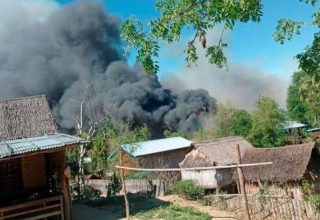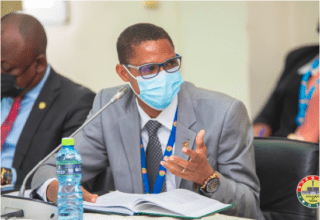
Prince Philip, the Duke of Edinburgh died on April 9, 2021 at 99, two months short of his 100th birthday. He was buried a week later on April 17, 2021.
On Saturday mornings between 7.30 and 9am, Joy FM has a comedy programme “Weekend City Show,” hosted by Sammy Forson with two actors/panellists Joseph Langabel and Reuben Adarkwa.
Affectionately, they call one another “Lang-B,” “Reu-B” and “Sam-B” even though there is no B in the host’s name!
On the news of the death of Prince Philip, while Reuben’s version was “The Prince of Philip”, Langabel’s was “The King of Edinburgh.”
Prince Philip
Despite being described as “unapologetically blunt,” Prince Philip had a keen sense of humour and was well liked.
Given his status as the husband of Queen Elizabeth II, and the patron of over 800 societies/clubs in the world, his funeral could easily have attracted thousands.
However, taking into account the COVID-19 pandemic, Prince Philip obviated this by restricting his funeral to only 30 members of the Royal family!
Indeed, the Head of Government, the Prime Minister, was not one of the 30!
Video clips have shown what is described as Ghanaian culture on show in London during Prince Philip’s funeral. Adowa and Kete flowed freely!
A post complained, maybe humorously, what translated as, “these British do not know how to conduct funerals.
They must come and learn from Ghana.” This reminded me of Chinua Achebe’s expression “crying more than the owner of the corpse” (the bereaved), in his book, Arrow of God.
While Prince Philip was buried in a week, Ghanaians have spent years in morgues while “preparations” were/are made to give them a “befitting funeral,” by our culture!
Togo/Benin/ Kenya
Meanwhile, our eastern neighbour Togo, and Benin do not keep bodies for more than three weeks and do not indulge in elaborate/expensive funerals.
During my stay in Kenya as the CEO of the African Peace Support Trainers’ Association in 2017, we lost our patron.
After a week, when I asked my secretary to arrange a visit to the bereaved family as we do in Ghana, she replied “Sir, he was buried yesterday!”
Noticing my surprise, she told me in Kenya, bodies were not kept more than two weeks.
She was surprised when I told her about our love for expensive and elaborate funerals in Ghana.
She then asked “Sir, what is the benefit of spending so much time, energy and money on elaborate/expensive funerals, after keeping bodies in the morgue for so long?” I had no answer.
When I have asked the same question at home, I have simply been told “it is our culture!”
Questions
What is culture, and which culture promotes the deep-freezing of bodies in morgues for years? What are the benefits of such deep-freezing to national development?
My simple understanding of culture is the totality of a people’s way of life, from birth to death, and all that goes on in the intervening years. Every society has a way of welcoming a baby to the world.
Education commences early informally at home on the dos and don’ts of that society on food/drinks, dress, music/dance, morals, respect, and then formal schooling. It ends with ceremonies on death!
Given my definition, culture is not static. Culture is dynamic as humans evolve through improvement of knowledge, science and technology.
Conclusion
Prince Philip restricted his funeral to 30 family members only. He did not want his remains to be put on a gun-carriage as was due him. Rather, he had an old land-rover converted for that. It was done.
So, why the Ghanaian fixation on expensive “befitting funerals”/extravaganzas attended by thousands?
In recent times, exhortations to limit numbers at funerals have been thrown overboard. Ghanaians say that they have been witnesses to extravagant huge funerals of big-people in society, which end up being super-spreaders of COVID-19.
Seeing no sincerity in what they are told, Ghanaians observe COVID-19 protocols more in the breach than in the observance.
During my morning walks, I appear the only odd-one with a facemask on. Indeed, recently a very educated retiree asked me: “General, why do you wear this mask?”
There is a lot to learn from the simple funeral of Prince Philp.
Culture is meant to be dynamic. We must, therefore, change to progress. How does keeping bodies for years contribute to Ghana’s development?
Prince Philip went beyond the culture of gun-carriage to an old land-rover and was buried in one week! Why can’t we do things simply and improve on our culture!
In all this, where is leadership? (Discipline/Integrity/Patriotism). Fellow Ghanaians, wake up!
Source: Graphic.com.gh




















